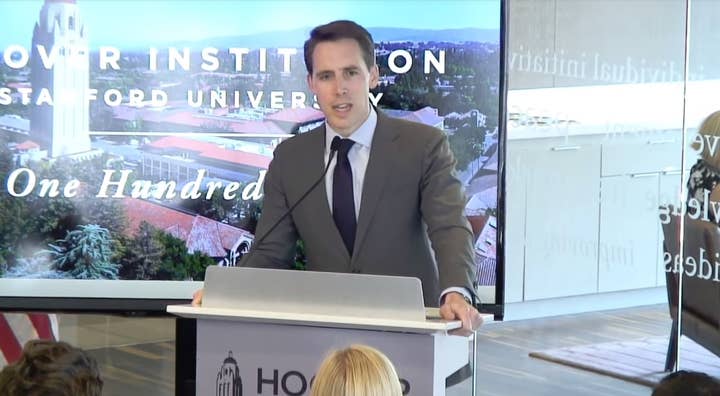US loot box bill receives bipartisan support
Republican senator's ban on loot boxes pay-to-win mechanics for children has been co-sponsored by two Democrats
As promised, Missouri Senator Josh Hawley introduced legislation into the US Senate yesterday seeking to ban loot boxes and pay-to-win mechanics in games for children.
Hawley has found two original co-sponsors for the Republican senator's proposal, and both are coming from the other side of the aisle. Democrats Richard Blumenthal (Connecticut) and Ed Markey (Massachusetts) have signed on to the bill.
"Only the addiction economy could produce a business model that relies on placing a casino in the hands of every child in America with the goal of getting them desperately hooked," Hawley said. "I'm proud to introduce this landmark, bipartisan legislation to end to these exploitative practices."
"Congress must send a clear warning to app developers and tech companies: Children are not cash cows to exploit for profit"
Sen. Richard Blumenthal
Markey added, "Today's digital entertainment ecosystem is an online gauntlet for children. Inherently manipulative game features that take advantage of kids and turn play time into pay time should be out of bounds."
Blumenthal noted the bi-partisan nature of the legislation and called the monetization practices reprehensible, saying, "Congress must send a clear warning to app developers and tech companies: Children are not cash cows to exploit for profit."
The Entertainment Software Association released its own statement on the bill, with CEO Stanley Pierre-Louis saying, "This legislation is flawed and riddled with inaccuracies. It does not reflect how video games work nor how our industry strives to deliver innovative and compelling entertainment experiences to our audiences.
"This legislation is flawed and riddled with inaccuracies"
ESA CEO Stanley Pierre-Louis
"The impact of this bill would be far-reaching and ultimately prove harmful to the player experience, not to mention the more than 220,000 Americans employed by the video game industry. We encourage the bill's co-sponsors to work with us to raise awareness about the tools and information in place that keep the control of video game play and in-game spending in parents' hands rather than in the government's."
The senators released the full text of the bill yesterday, which prohibits publication or distribution of games with pay-to-win mechanics or loot boxes in "minor-oriented games" or any game where the company "has constructive knowledge that any users are under age 18."
It makes exceptions for any program where the user's interactions are "limited to selecting options from a menu of choices" or any program that "would not be considered a game by a reasonable user."
The bill's definition of "pay-to-win" includes offerings that ease a user's progression with content that could be earned without purchases, as well as letting a player pay to skip cooldown timers or buy additional lives/gameplay attempts. It also includes any purchase in a game featuring competition between players that gives one player an advantage over those who don't spend money.
The bill makes specific exemptions for harder difficulty modes, purely cosmetic items that give no gameplay advantage to a user, and DLC that can only be purchased once and doesn't otherwise give competitive advantages or help players progress easier.
As for the definition of loot box, the bill would apply to any add-on transaction that adds a feature or enhances entertainment value in a randomized or partially randomized fashion. It also specifies any system where buying something unlocks the ability to buy other things that users aren't informed about before the initial transaction.
The bill stipulates that the Federal Trade Commission will enforce these rules, levying fines that must exceed the amount of money a company brought in through any violations of the bill. It also allows state attorneys general to bring civil suits against any publisher or distributor violating the law.
Finally, the bill calls for the FTC to prepare a report for Congress analyzing the psychological effects of pay-to-win microtransactions and loot box design, the effect those mechanics have had on investment and production in the games industry, and whether they can induce compulsive purchasing behavior by minors.
The bill has been referred to the Committee on Commerce, Science, and Transportation. Both Blumenthal and Markey sit on that committee, and are also members of two relevant subcommittees: Manufacturing, Trade, and Consumer Protection; and Communications, Technology, Innovation, and The Internet.

